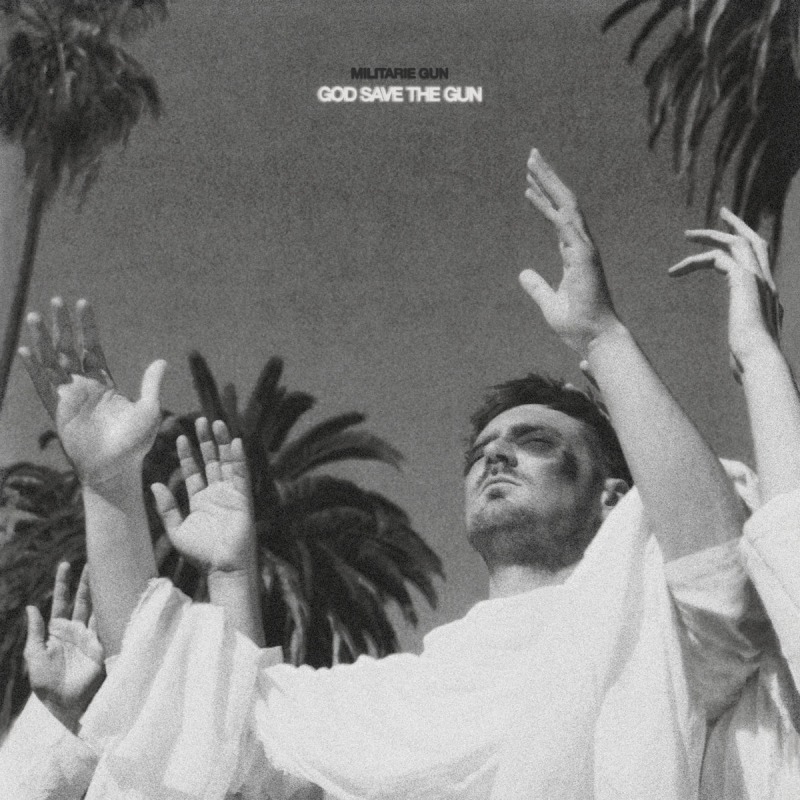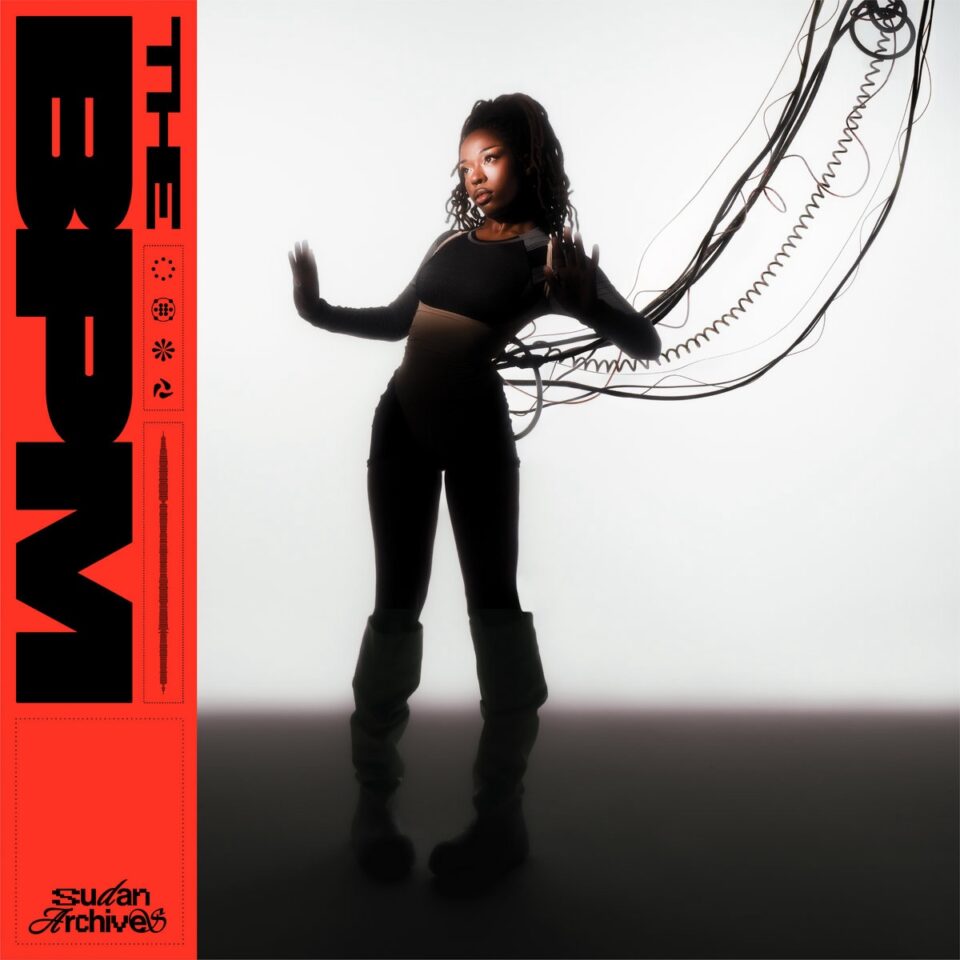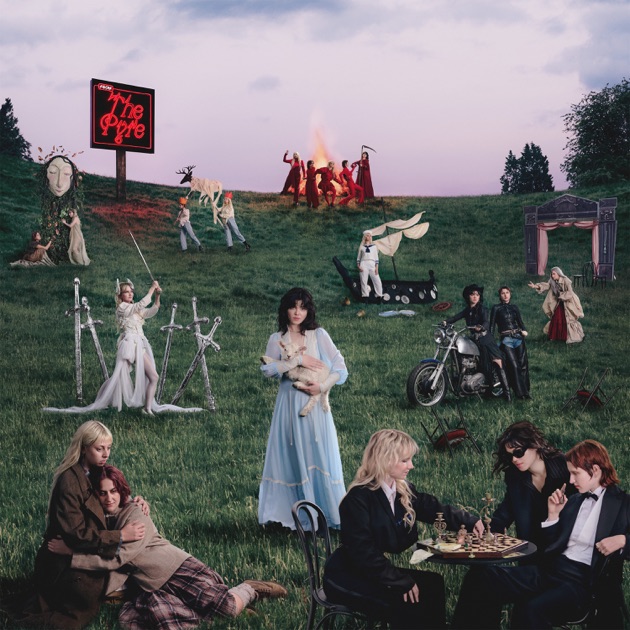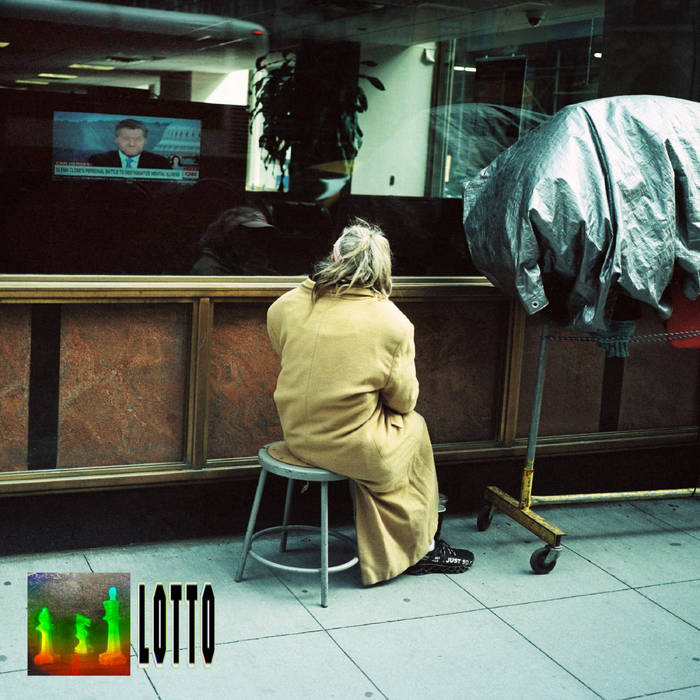Best New Albums: This Week’s Records to Stream
Tap in and find your next obsession.

Paste is the place to kick off each and every New Music Friday. We follow our regular roundups of the best new songs by highlighting the most compelling new records you need to hear. Find the best new albums of the week below, from priority picks to honorable mentions.
bar italia: Some Like It Hot
 Inspired by the 1959 crime comedy of the same name, Some Like It Hot finds bar italia leaning harder into indie-rock tropes and lyrical storytelling. Like the film, the album brims with tales of jaded starlets, hapless lovers, and opportunistic gossips. Take the raucous opener “Fundraiser,” where Nina Cristante slips into the role of a pompous actress, while Sam Fenton plays a lovestruck fan masquerading as a lackadaisical lover. “You spend your life on the list but to me you don’t exist,” he sings, later pleading, “Have you had enough of the phone calls? / When I don’t have your love it’s a lonely war.” Cristante cooly counters, “I don’t think I’ve actually met you / Can’t even remember your face / Like it happens to lovers in love / I don’t think I even like you.” It’s one of the record’s most cohesive narratives, though the instrumentals behind it feel surprisingly forgettable. It’s a familiar pattern on songs like “I Make My Own Dust,” “omni shambles,” and “Eyepatch.” But the band gains some footing on the grungy “Cowbella,” which is a proper alt-rock anthem with searing guitars to match. The track drips with sarcasm as the trio take turns sharing gossip about an unknown female protagonist. “You got a lot of friends, got a lot of friends / But how many like you?,” Fenton sings. The quality rock sound continues on “rooster” where the gang explores the concept of obsession, and Cristante’s weary delivery truly sells the chaos within. “I’m shaking hands with all the thoughts I killed last week / They’re so sticky they’re glued to my head / I’m shaking hands cos I know there’s no end to this / I have a headache that I can taste.” Driving bass and tangled guitars build tension until the song bursts open in a haze of feedback. As bar italia releases more records, it’s clear that they’re carving out a more cohesive sound for themselves. Still, that switch comes with a cost. Sure, the trio is succeeding in having the term “mysterious” pulled away from them. They’ve traded the dark, lo-fi sounds of quarrel and bedhead, and the grungy post-punk sounds of Tracey Denim and The Twits, for a cleaner, more traditional indie rock sound. —Camryn Teder [Matador]
Inspired by the 1959 crime comedy of the same name, Some Like It Hot finds bar italia leaning harder into indie-rock tropes and lyrical storytelling. Like the film, the album brims with tales of jaded starlets, hapless lovers, and opportunistic gossips. Take the raucous opener “Fundraiser,” where Nina Cristante slips into the role of a pompous actress, while Sam Fenton plays a lovestruck fan masquerading as a lackadaisical lover. “You spend your life on the list but to me you don’t exist,” he sings, later pleading, “Have you had enough of the phone calls? / When I don’t have your love it’s a lonely war.” Cristante cooly counters, “I don’t think I’ve actually met you / Can’t even remember your face / Like it happens to lovers in love / I don’t think I even like you.” It’s one of the record’s most cohesive narratives, though the instrumentals behind it feel surprisingly forgettable. It’s a familiar pattern on songs like “I Make My Own Dust,” “omni shambles,” and “Eyepatch.” But the band gains some footing on the grungy “Cowbella,” which is a proper alt-rock anthem with searing guitars to match. The track drips with sarcasm as the trio take turns sharing gossip about an unknown female protagonist. “You got a lot of friends, got a lot of friends / But how many like you?,” Fenton sings. The quality rock sound continues on “rooster” where the gang explores the concept of obsession, and Cristante’s weary delivery truly sells the chaos within. “I’m shaking hands with all the thoughts I killed last week / They’re so sticky they’re glued to my head / I’m shaking hands cos I know there’s no end to this / I have a headache that I can taste.” Driving bass and tangled guitars build tension until the song bursts open in a haze of feedback. As bar italia releases more records, it’s clear that they’re carving out a more cohesive sound for themselves. Still, that switch comes with a cost. Sure, the trio is succeeding in having the term “mysterious” pulled away from them. They’ve traded the dark, lo-fi sounds of quarrel and bedhead, and the grungy post-punk sounds of Tracey Denim and The Twits, for a cleaner, more traditional indie rock sound. —Camryn Teder [Matador]
Casey Dienel: My Heart Is an Outlaw
 It’s time to have a conversation about Casey Dienel’s first record after quitting the business and ditching their old name, My Heart Is An Outlaw: All four singles were starry, epic, and gorgeous. “Seventeen” and “Your Girl’s Upstairs” were vivid sprawls, but “The Butcher Is My Friend” (paired with A-side “People Can Change”) is Dienel’s straightest effort yet—and probably their best. The song sticks to you even when it flirts with total unrest. A chugging tandem of Max Jaffe’s percussion and Spencer Zahn’s bass anchors the tone while Meg Duffy’s splashy, twisting guitar howls above water. And Dienel rummages in the melody in a perfect, curious way, cresting through ideas about new love and a potent, if-not-detrimental fear of abandonment—of the self and the one you covet. “Cruise out to the spit, pelicans swan giving,” they sing. “Draw the moon so near, take a bite. It’s so soft, I could get used to this. But this heart won’t trust it.” Woodwinds and horns, courtesy of Aaron Rockers, Adam Dotson, Adam Schatz, and Jonah Parzen-Johnson, uncork in the scrim. Dienel declares, “Make a little fist, dive in,” until Schatz’s synth programming starts to sweep and blade. “Who cares who loves more?” “Seventeen” is a different bird—one warped by an epic yet patient sprawl. It’s emotional, it’s overjoyed. Schatz’s synth wobbles and sways against the current of a four-part string melody, performed by violinists Laurann Angel and Lily Honigberg, violist Marta Honer, and cellist Emily Elkin. But there are too many working parts and small details here that ought to be celebrated, like the harmonies provided by Starr Busby, Nina Moffitt, and Jachary, or the bass guitar played by Zahn. And Carly Bond’s guitar is faint but aflame in the vibrations of Jaffe’s four-on-the-floor percussion. “Seventeen” is seven minutes long and, rather than drop us into the middle of a conversation, Dienel regales its story from the beginning. “Carol was a barfly with a red face,” they sing. “Saw a smile like his once, carved in a Jack-o-Lantern. When he moved, the whole bar swayed with him, like all that could steady him was making conversation with strange girls.” Adapted from real “memories and revelations” and set at a pub in Galway, Dienel turns a dance song about a charming stranger into a braided essay about infatuation and brevity and boozy ephemera with too many tattooable lines. I especially can’t get this one out of my head: “Some people are like magnets, they really got a shine to them. I guess you had to be there.” Dienel delivers every word with a nonchalance. Yet, there’s an ecstatic hue to every verse. All synapses are firing in the company of captivation: “It’ll feel like when you’re seventeen, like right before it all fell into place. One more round before the night is over, one last dance before we fade away.” The drip-fed rebirth of Dienel’s has been a marvel to sit with. —Matt Mitchell [Jealous Butcher]
It’s time to have a conversation about Casey Dienel’s first record after quitting the business and ditching their old name, My Heart Is An Outlaw: All four singles were starry, epic, and gorgeous. “Seventeen” and “Your Girl’s Upstairs” were vivid sprawls, but “The Butcher Is My Friend” (paired with A-side “People Can Change”) is Dienel’s straightest effort yet—and probably their best. The song sticks to you even when it flirts with total unrest. A chugging tandem of Max Jaffe’s percussion and Spencer Zahn’s bass anchors the tone while Meg Duffy’s splashy, twisting guitar howls above water. And Dienel rummages in the melody in a perfect, curious way, cresting through ideas about new love and a potent, if-not-detrimental fear of abandonment—of the self and the one you covet. “Cruise out to the spit, pelicans swan giving,” they sing. “Draw the moon so near, take a bite. It’s so soft, I could get used to this. But this heart won’t trust it.” Woodwinds and horns, courtesy of Aaron Rockers, Adam Dotson, Adam Schatz, and Jonah Parzen-Johnson, uncork in the scrim. Dienel declares, “Make a little fist, dive in,” until Schatz’s synth programming starts to sweep and blade. “Who cares who loves more?” “Seventeen” is a different bird—one warped by an epic yet patient sprawl. It’s emotional, it’s overjoyed. Schatz’s synth wobbles and sways against the current of a four-part string melody, performed by violinists Laurann Angel and Lily Honigberg, violist Marta Honer, and cellist Emily Elkin. But there are too many working parts and small details here that ought to be celebrated, like the harmonies provided by Starr Busby, Nina Moffitt, and Jachary, or the bass guitar played by Zahn. And Carly Bond’s guitar is faint but aflame in the vibrations of Jaffe’s four-on-the-floor percussion. “Seventeen” is seven minutes long and, rather than drop us into the middle of a conversation, Dienel regales its story from the beginning. “Carol was a barfly with a red face,” they sing. “Saw a smile like his once, carved in a Jack-o-Lantern. When he moved, the whole bar swayed with him, like all that could steady him was making conversation with strange girls.” Adapted from real “memories and revelations” and set at a pub in Galway, Dienel turns a dance song about a charming stranger into a braided essay about infatuation and brevity and boozy ephemera with too many tattooable lines. I especially can’t get this one out of my head: “Some people are like magnets, they really got a shine to them. I guess you had to be there.” Dienel delivers every word with a nonchalance. Yet, there’s an ecstatic hue to every verse. All synapses are firing in the company of captivation: “It’ll feel like when you’re seventeen, like right before it all fell into place. One more round before the night is over, one last dance before we fade away.” The drip-fed rebirth of Dienel’s has been a marvel to sit with. —Matt Mitchell [Jealous Butcher]
Jane Inc.: A Rupture a Canyon a Birth
 Jane Inc.’s third record explores the radical rebirth of musician Carlyn Bezic after she hit a string of life-altering events, beginning with a semi-truck ramming into her broken-down tour van. While Bezic and her bandmates made it out alive, the moment was the beginning of a period of upheaval, especially for Bezic. Upon returning home from tour, she ended her relationship of nearly a decade and learned she had an early stage of cancer in her left vocal cord. “what if” imagines a timeline where this crash splits Bezic into two separate people, Carlyn and her musical persona, Jane. Bezic is filmed wandering city streets to a bubbly bass drum, ambling through a cemetery and scaling subway steps until she is led to a sunny rooftop where Jane stands. The two women face off, and eventually Jane is handed the rest of the video, running through parked cars and dancing in a field of grass with total abandon. In the words of the real Carlyn, “Carlyn walks away to continue a life in which the accident never happened, leaving Jane (pure, unadulterated, in her final form) to be born, hungry for life.” The dizzy disco beats provoke a wildness in Jane, and she lets herself be reborn like the “glass shattered like glitter” of the car wreck. When she’s broken into a million pieces, she’s part of the “the millions and millions of possibilities” that hide in the rubble of a wreck. —Caroline Nieto [Telephone Explosion]
Jane Inc.’s third record explores the radical rebirth of musician Carlyn Bezic after she hit a string of life-altering events, beginning with a semi-truck ramming into her broken-down tour van. While Bezic and her bandmates made it out alive, the moment was the beginning of a period of upheaval, especially for Bezic. Upon returning home from tour, she ended her relationship of nearly a decade and learned she had an early stage of cancer in her left vocal cord. “what if” imagines a timeline where this crash splits Bezic into two separate people, Carlyn and her musical persona, Jane. Bezic is filmed wandering city streets to a bubbly bass drum, ambling through a cemetery and scaling subway steps until she is led to a sunny rooftop where Jane stands. The two women face off, and eventually Jane is handed the rest of the video, running through parked cars and dancing in a field of grass with total abandon. In the words of the real Carlyn, “Carlyn walks away to continue a life in which the accident never happened, leaving Jane (pure, unadulterated, in her final form) to be born, hungry for life.” The dizzy disco beats provoke a wildness in Jane, and she lets herself be reborn like the “glass shattered like glitter” of the car wreck. When she’s broken into a million pieces, she’s part of the “the millions and millions of possibilities” that hide in the rubble of a wreck. —Caroline Nieto [Telephone Explosion]
Militarie Gun: God Save the Gun
 By all accounts, God Save the Gun, Militarie Gun’s sophomore album, has a lot going on—both on the surface and beneath it. It marks a bold leap forward for the Los Angeles based band, conceptually and artistically, pulling in new sounds, raw reflections on self-destruction, and some nineties ethos. At face value, it’s a concept album about hitting rock bottom and the arc of that crashing, burning, rebuilding, and repeating. It’s a window into Ian Shelton’s psyche following their debut Life Under the Gun, as Militarie Gun navigates their rise and the sobering realization that success can blur the line between observer and subject. It’s a vulnerable portrait of Shelton at his lowest, wrestling with addiction, depression, and the urge to slip back into self-destructive habits. Sonically, the album also feels like an ode to the bands and genres that carried him through those times. “Pt. II” kicks things off with a distorted spoken word piece of Shelton responding to how he’s been. Judging by his bruised, defeated face on the album’s cover, it’s not good. It is “B.A.D,” to be exact, as it drops straight into lead single “B.A.D.I.D.E.A,” an arena-sized power-punk anthem Shelton originally wrote for Doja Cat, when she expressed interest in making a hardcore punk album two years ago. That might sound odd, but Militarie Gun has been hovering at the edge of pop culture for a while. Post Malone is a fan, and there is a viral video of him singing along with Shelton to “Do It Faster” backstage. The band also contributed an instrumental track for Malone’s character in the WWE 2K24 video game. God Save the Gun was produced by Riley MacIntyre (Adele, LCD Soundsystem, Arlo Parks), a collaborator whose pop pedigree seeps into the record’s undeniable hooks and polished sense of melody. But despite that, nothing on this record feels like a forced grab at stardom. It is simply a progression of Militarie Gun’s sound with layers of synth and vocal experimentation added in. —Ricky Adams [Loma Vista]
By all accounts, God Save the Gun, Militarie Gun’s sophomore album, has a lot going on—both on the surface and beneath it. It marks a bold leap forward for the Los Angeles based band, conceptually and artistically, pulling in new sounds, raw reflections on self-destruction, and some nineties ethos. At face value, it’s a concept album about hitting rock bottom and the arc of that crashing, burning, rebuilding, and repeating. It’s a window into Ian Shelton’s psyche following their debut Life Under the Gun, as Militarie Gun navigates their rise and the sobering realization that success can blur the line between observer and subject. It’s a vulnerable portrait of Shelton at his lowest, wrestling with addiction, depression, and the urge to slip back into self-destructive habits. Sonically, the album also feels like an ode to the bands and genres that carried him through those times. “Pt. II” kicks things off with a distorted spoken word piece of Shelton responding to how he’s been. Judging by his bruised, defeated face on the album’s cover, it’s not good. It is “B.A.D,” to be exact, as it drops straight into lead single “B.A.D.I.D.E.A,” an arena-sized power-punk anthem Shelton originally wrote for Doja Cat, when she expressed interest in making a hardcore punk album two years ago. That might sound odd, but Militarie Gun has been hovering at the edge of pop culture for a while. Post Malone is a fan, and there is a viral video of him singing along with Shelton to “Do It Faster” backstage. The band also contributed an instrumental track for Malone’s character in the WWE 2K24 video game. God Save the Gun was produced by Riley MacIntyre (Adele, LCD Soundsystem, Arlo Parks), a collaborator whose pop pedigree seeps into the record’s undeniable hooks and polished sense of melody. But despite that, nothing on this record feels like a forced grab at stardom. It is simply a progression of Militarie Gun’s sound with layers of synth and vocal experimentation added in. —Ricky Adams [Loma Vista]
Read: “Militarie Gun Blow Up, Break Down, and Break Through On God Save the Gun”
Skullcrusher: And Your Songs Is Like a Circle
 And Your Song is Like a Circle was inspired by, and written throughout, a cross-country move whose destabilizing force knocked Helen Ballentine off-kilter and expanded her songwriting scope from the familiar discord of the domestic to frightening, inevitable scenes of spatiotemporal change. The album’s opening lyric, “What do I live for?” floats forth atop sparse, lugubrious piano and orchestral vocal harmonies, a hint at the confusion that will undergird most of its imagery. Ballentine’s searching, exploratory lyrics have always been a strength, and her new project is no exception. On “Living,” a sweet, searching bildungsroman of a track, she sings, “You are going through the motions / Of the evening / In your body you are living / In the passing of an hour.” The lyric’s minimalism is bolstered by a sparkling, swelling wave of acoustic strings; as the song opens and softens, it nurses the cotidian into something worth examining—that is, into a life. Ballentine has an instinctive feel for sparseness, a tool she uses with abandon and to great emotional effect. On the album’s opener “March,” an operatic, piano-heavy base is whittled down to its barest parts, waves crashing and strings held until they’re whispers of themselves. On “Periphery,” one of the album’s lusher moments, a repeating acoustic chord progression and a gently ambient soundscape make up the bulk of the instrumentation—it is Ballentine’s ghostly self-harmonizing that fills the sonic space. —Miranda Wollen [Dirty Hit]
And Your Song is Like a Circle was inspired by, and written throughout, a cross-country move whose destabilizing force knocked Helen Ballentine off-kilter and expanded her songwriting scope from the familiar discord of the domestic to frightening, inevitable scenes of spatiotemporal change. The album’s opening lyric, “What do I live for?” floats forth atop sparse, lugubrious piano and orchestral vocal harmonies, a hint at the confusion that will undergird most of its imagery. Ballentine’s searching, exploratory lyrics have always been a strength, and her new project is no exception. On “Living,” a sweet, searching bildungsroman of a track, she sings, “You are going through the motions / Of the evening / In your body you are living / In the passing of an hour.” The lyric’s minimalism is bolstered by a sparkling, swelling wave of acoustic strings; as the song opens and softens, it nurses the cotidian into something worth examining—that is, into a life. Ballentine has an instinctive feel for sparseness, a tool she uses with abandon and to great emotional effect. On the album’s opener “March,” an operatic, piano-heavy base is whittled down to its barest parts, waves crashing and strings held until they’re whispers of themselves. On “Periphery,” one of the album’s lusher moments, a repeating acoustic chord progression and a gently ambient soundscape make up the bulk of the instrumentation—it is Ballentine’s ghostly self-harmonizing that fills the sonic space. —Miranda Wollen [Dirty Hit]
Read: “On And Your Song is Like a Circle, Skullcrusher Makes Peace With Looking Back”
Sudan Archives: The BPM
 The BPM’s prominent Afrofuturistic concept evokes the chrome-plated sci-fi aesthetic of Janelle Monáe’s Dirty Computer as well as the cavernous, neon-lit sensuality of Kelela’s Raven, but its hypnotic, rave-like energy and avant-garde impulses place it in a league entirely of its own. In contrast to her wide array of outside collaborators on Prom Queen, Brittney Parks’s roster on The BPM is a slightly more intimate affair, working mainly with her longtime manager and producer Ben Dickey, her sister Catherine, and her cousins from Detroit. But similar to her previous efforts, Parks has adopted a persona that aligns with the overarching theme of her output; in this case, she embodies “Gadget Girl” on The BPM, a hyper-independent alter ego who relies on technology to express herself. In inhabiting “Gadget Girl,” Parks reckons with the painful, often isolating experience of being a self-sufficient human while searching for a release from all the external pressures that come with it in the safe, freeing space of the club. These layers suffuse The BPM with palpable emotion and dynamism, frequently beguiling in straddling the line between meditative and boisterous. Parks does a remarkable job finding the fun in her introspection in a way that feels organic rather than forced. On the opener “DEAD,” she skillfully maintains that balance, singing in conversation with herself over a big and bombastic drum ‘n’ bass beat and a spirited whir of strings, the latter of which is provided partly by Chicago-based Black chamber collective D-Composed. —Sam Rosenberg [Stones Throw]
The BPM’s prominent Afrofuturistic concept evokes the chrome-plated sci-fi aesthetic of Janelle Monáe’s Dirty Computer as well as the cavernous, neon-lit sensuality of Kelela’s Raven, but its hypnotic, rave-like energy and avant-garde impulses place it in a league entirely of its own. In contrast to her wide array of outside collaborators on Prom Queen, Brittney Parks’s roster on The BPM is a slightly more intimate affair, working mainly with her longtime manager and producer Ben Dickey, her sister Catherine, and her cousins from Detroit. But similar to her previous efforts, Parks has adopted a persona that aligns with the overarching theme of her output; in this case, she embodies “Gadget Girl” on The BPM, a hyper-independent alter ego who relies on technology to express herself. In inhabiting “Gadget Girl,” Parks reckons with the painful, often isolating experience of being a self-sufficient human while searching for a release from all the external pressures that come with it in the safe, freeing space of the club. These layers suffuse The BPM with palpable emotion and dynamism, frequently beguiling in straddling the line between meditative and boisterous. Parks does a remarkable job finding the fun in her introspection in a way that feels organic rather than forced. On the opener “DEAD,” she skillfully maintains that balance, singing in conversation with herself over a big and bombastic drum ‘n’ bass beat and a spirited whir of strings, the latter of which is provided partly by Chicago-based Black chamber collective D-Composed. —Sam Rosenberg [Stones Throw]
Read: “Sudan Archives Marches to the Beat of Her Own Drum Machine On The BPM”
Tame Impala: Deadbeat
 At long last, Tame Impala is back. Deadbeat is Kevin Parker’s first album since 2020’s The Slow Rush, and lead single “End of Summer” feels like if “Be Above It” went acid house. Parker combines thick bass tones and intricate backbeats with his quintessentially reverebed vocals that I am certain are distinct enough to wake me from a coma. The song oscillates between a Berlin basement at 3 AM and the sunrise walk home a few hours later; shimmering chorals are met with crunchy cymbals and heavy bass. And Parker doesn’t forget to get philosophical with it: “Just cause I don’t regret it, doesn’t mean I won’t think about it” hit me square in the chest on the first listen. Tame Impala as a project has never stayed in one place for long—the gritty psych-rock of Innerspeaker made way for the flanging distortion of Lonerism, before Currents propelled Parker into psychedelic synth super stardom. The Slow Rush offered hints of a potential pivot to dance music, with trancey hooks, a pop lean, and the occasional thumping bass. And he hasn’t been quiet in the interim. He had a fluffy, relatively phoned-in feature on the Barbie soundtrack, dropped an underrated single with Thundercat, and was Dua Lipa’s right-hand producer for the Radical Optimism era. But “End of Summer” is the first true solo Tame Impala single in over five years. Now we just have to wait and see how much further into the EDM world he intends to travel. “Loser” is the psychedelic foil to last month’s trancey and expansive house track “End of Summer,” with a drawn-out cadence that feels like the final mix was dropped in a vat of molasses. The guitar and bass circle the same melody that’s later mimicked in the chorus: a quick sixteenth-note run (“I’m a loser”) with a sigh at the end (“babe”). Parker’s quintessential falsettos send a shiver down my spine (complimentary), with their distinct yet distorted tone that I’m certain I could make out from miles away. It’s nostalgic and inventive at the same time, with self-depricating lyrics (“I’m a tragedy / Trying to figure my whole life out”) that feel even more honest than those we heard on Currents-era songs like “‘Cause I’m A Man” or “New Person, Same Old Mistakes.” —Cassidy Sollazzo [Columbia]
At long last, Tame Impala is back. Deadbeat is Kevin Parker’s first album since 2020’s The Slow Rush, and lead single “End of Summer” feels like if “Be Above It” went acid house. Parker combines thick bass tones and intricate backbeats with his quintessentially reverebed vocals that I am certain are distinct enough to wake me from a coma. The song oscillates between a Berlin basement at 3 AM and the sunrise walk home a few hours later; shimmering chorals are met with crunchy cymbals and heavy bass. And Parker doesn’t forget to get philosophical with it: “Just cause I don’t regret it, doesn’t mean I won’t think about it” hit me square in the chest on the first listen. Tame Impala as a project has never stayed in one place for long—the gritty psych-rock of Innerspeaker made way for the flanging distortion of Lonerism, before Currents propelled Parker into psychedelic synth super stardom. The Slow Rush offered hints of a potential pivot to dance music, with trancey hooks, a pop lean, and the occasional thumping bass. And he hasn’t been quiet in the interim. He had a fluffy, relatively phoned-in feature on the Barbie soundtrack, dropped an underrated single with Thundercat, and was Dua Lipa’s right-hand producer for the Radical Optimism era. But “End of Summer” is the first true solo Tame Impala single in over five years. Now we just have to wait and see how much further into the EDM world he intends to travel. “Loser” is the psychedelic foil to last month’s trancey and expansive house track “End of Summer,” with a drawn-out cadence that feels like the final mix was dropped in a vat of molasses. The guitar and bass circle the same melody that’s later mimicked in the chorus: a quick sixteenth-note run (“I’m a loser”) with a sigh at the end (“babe”). Parker’s quintessential falsettos send a shiver down my spine (complimentary), with their distinct yet distorted tone that I’m certain I could make out from miles away. It’s nostalgic and inventive at the same time, with self-depricating lyrics (“I’m a tragedy / Trying to figure my whole life out”) that feel even more honest than those we heard on Currents-era songs like “‘Cause I’m A Man” or “New Person, Same Old Mistakes.” —Cassidy Sollazzo [Columbia]
The Last Dinner Party: From the Pyre
 If Prelude to Ecstasy was the sermon, From The Pyre is the heresy. The Last Dinner Party sound like they’ve crawled out of their own cathedral, gowns torn, mascara running, candles still burning in their teeth. “One kiss and I was disemboweled,” Abigail Morris sings on “Agnus Dei,” and that’s the mission statement: beauty as bloodsport. The band’s grandiosity hasn’t dimmed; it’s grown teeth. “This Is the Killer Speaking” turns ghosting into a glam-country shootout, “Rifle” stomps through sludge and smoke like Sabbath in corsets, and “Woman Is a Tree” summons some pagan ghost choir from beneath the roots. Every song feels like a séance for something they’ve had to kill—faith, love, restraint, maybe all three. But the record’s not just melodrama for its own sake. It burns because it believes in what’s left after the fire. “I Hold Your Anger” cracks open the soft terror of caretaking; “The Scythe” reanimates grief into grace (“Don’t cry, we’re bound together / Each life runs its course”). Where their debut looked up at heaven, From The Pyre looks back from the flames, laughing, radiant, unrepentant. It’s not resurrection they’re after, but survival—what it’s like to feel alive. Casey Epstein-Gross [Island]
If Prelude to Ecstasy was the sermon, From The Pyre is the heresy. The Last Dinner Party sound like they’ve crawled out of their own cathedral, gowns torn, mascara running, candles still burning in their teeth. “One kiss and I was disemboweled,” Abigail Morris sings on “Agnus Dei,” and that’s the mission statement: beauty as bloodsport. The band’s grandiosity hasn’t dimmed; it’s grown teeth. “This Is the Killer Speaking” turns ghosting into a glam-country shootout, “Rifle” stomps through sludge and smoke like Sabbath in corsets, and “Woman Is a Tree” summons some pagan ghost choir from beneath the roots. Every song feels like a séance for something they’ve had to kill—faith, love, restraint, maybe all three. But the record’s not just melodrama for its own sake. It burns because it believes in what’s left after the fire. “I Hold Your Anger” cracks open the soft terror of caretaking; “The Scythe” reanimates grief into grace (“Don’t cry, we’re bound together / Each life runs its course”). Where their debut looked up at heaven, From The Pyre looks back from the flames, laughing, radiant, unrepentant. It’s not resurrection they’re after, but survival—what it’s like to feel alive. Casey Epstein-Gross [Island]
They Are Gutting A Body Of Water: LOTTO
 LOTTO is worlds more polished and confident than TAGABOW’s previous efforts, as if they entered the making of it as an entirely new band. Intro track “the chase” is ruthless and explosive, punctured by glossy bits of guitar, as Doug Dulgarian monologues about his lowest experience with addiction which occurred on New Year’s Day in 2025. He poignantly touches on the soul-crushing emptiness of withdrawal, walking us through the horrifying depersonalization and eventual burst of relief that follows: “I finally feel the comforting and familiar feeling of potential sleep rising up through the bile in my throat” The progression of the instrumentals mirror this descent, as Dulgarian’s strained voice becomes a whisper threading through the high-pitched fuzz, something it tends to do excellently on “sour diesel” and “trainers.” Bits and pieces of past TAGABOW projects make their way onto LOTTO, as the band embraces what’s made their brand of guitar music so unmistakably recognizable. The playful Ocarina-esque flutes at the end of “sour diesel” ring reminiscent of “lucky styles”; “slo crostic,” the album’s wordless instrumental break, reminds me of the passages scattered throughout s and 2019’s Destiny XL; the twangy notes of 8-bit chips in “trainers” sound like they were pulled from the background of an N64 game. LOTTO’s rollout was full of surprisingly catchy singles—think: “american food” and “rl stine,” two songs with tender, achy riffs and lyrics that paint the album’s themes of want and desperation. It’s easy to picture a crowd at one of TAGABOW’s enthralling live shows, swarming around the band performing with their backs turned to them, bobbing along to “american food” and reciting its Auto-Tune chorus. There’s solace to be found on this record, in its U.S. interstate imagery on “the sound of that car going by” and “the death of a dealership.” The dreamy feedback laced into “rl stine” beckons the same feeling as “Mayonnaise” by Smashing Pumpkins, and scattered phrases illustrate a story of two people falling down together: ”same / crawlspace / love / always.” —Alli Dempsey [Julia’s War]
LOTTO is worlds more polished and confident than TAGABOW’s previous efforts, as if they entered the making of it as an entirely new band. Intro track “the chase” is ruthless and explosive, punctured by glossy bits of guitar, as Doug Dulgarian monologues about his lowest experience with addiction which occurred on New Year’s Day in 2025. He poignantly touches on the soul-crushing emptiness of withdrawal, walking us through the horrifying depersonalization and eventual burst of relief that follows: “I finally feel the comforting and familiar feeling of potential sleep rising up through the bile in my throat” The progression of the instrumentals mirror this descent, as Dulgarian’s strained voice becomes a whisper threading through the high-pitched fuzz, something it tends to do excellently on “sour diesel” and “trainers.” Bits and pieces of past TAGABOW projects make their way onto LOTTO, as the band embraces what’s made their brand of guitar music so unmistakably recognizable. The playful Ocarina-esque flutes at the end of “sour diesel” ring reminiscent of “lucky styles”; “slo crostic,” the album’s wordless instrumental break, reminds me of the passages scattered throughout s and 2019’s Destiny XL; the twangy notes of 8-bit chips in “trainers” sound like they were pulled from the background of an N64 game. LOTTO’s rollout was full of surprisingly catchy singles—think: “american food” and “rl stine,” two songs with tender, achy riffs and lyrics that paint the album’s themes of want and desperation. It’s easy to picture a crowd at one of TAGABOW’s enthralling live shows, swarming around the band performing with their backs turned to them, bobbing along to “american food” and reciting its Auto-Tune chorus. There’s solace to be found on this record, in its U.S. interstate imagery on “the sound of that car going by” and “the death of a dealership.” The dreamy feedback laced into “rl stine” beckons the same feeling as “Mayonnaise” by Smashing Pumpkins, and scattered phrases illustrate a story of two people falling down together: ”same / crawlspace / love / always.” —Alli Dempsey [Julia’s War]
Read: “They Are Gutting A Body Of Water Confront False Pleasures on LOTTO”
Other Notable New Album Releases This Week: All Time Low: Everyone’s Talking!; Chrissie Hynde & Pals: Duets Special; Cusp: What I Want Doesn’t Want Me; Dear Boy: Celebrator; Elias Rønnenfelt: Speak Daggers; Living Hour: Internal Drone Infinity; Rachel Bobbitt: Swimming Towards the Sand; Ron Gallo: Checkmate; The Subways: When I’m With You; William Prince: Further From the Country







































